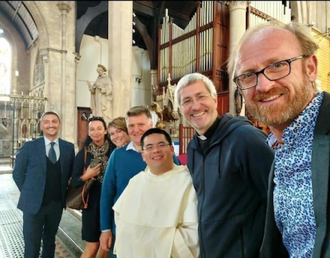ICN media course 3 - Getting the news out

Pictures of people attract more readers. Image: Radio Maria team just moved to Rosary Shrine
So you've written your press release - telling people about an upcoming event in your parish, school or organisation - what next?
Although the whole media world is changing very quickly - especially since the covid lockdown - some publications have gone - many more have sprung up - and with new media there are all sorts of new sites that may be very interested in your news. Journalists need you. They wouldn't survive without people sending them information.
Because of privacy laws I can't give you a sample contact list - but you can build up your own list of email addresses using these tips:
1. Local press - whether your local paper is published in a hard copy or online - they are always on the lookout for local stories. They may well have a listing section as well.
You can send your press release to the 'news desk' - or 'news editor' - but its better if you can send it to a named journalist. Once they've met you - you will be going in their contact book!
2. Send on the right date. Online publications are often updated every day - so timing is not so important. But if you are writing to a weekly paper or magazine - make sure you send your press release well in advance of their press deadline day.
3. Catholic press - all the above rules apply.
4. Specialist media. There are publications - online and hard copies - covering just about every subject. So with a bit of lateral thinking you might be able to get your report on the new computers in your local school in a technology or education magazine. Housing magazines would like to know about your parish homeless project. Magazines for different ages groups would be interested in stories about volunteer projects. Travel magazines may be interested in your pilgrimage this summer retracing an old pilgrim route.
5. National media. Harder to get into but if you've got something a bit different - a celebrity visitor, an unusual event or activity give it a go. A few months ago a primary school in the north of England contacted astronauts at NASA to help them with a science project. They didn't tell the press but I remember thinking what a cool story that was!
6. Your Diocese. Every diocese has someone responsible for media and a website - with space for listings and news. Make sure you are on their radar. They also have their own media contact lists - so if you send them a good press release they may well circulate it for you.
7. Local Radio - they are always keen to report on community events. Make sure they know about yours.
8. Pictures. Include pictures in jpg format with any press release you send out, if you can. People might want to use their own - but if you supply one or two images (not too many) - according to a recent article I read - editors are seven times more likely to use an article accompanied by a picture. Pictures of people especially make a difference. (See image above).
9. Social Media - Once your press release has been published - whether its in a local, national or specialist press online - tell everyone about it on social media. Twitter and Facebook are probably the best ones for church news. You can do this on your personal social media accounts. If your parish, school or organisation doesn't have a Facebook or Twitter account - check with them to see if they would like one. Not everyone does - but sensible use of social media can really boost your audience. Pope Francis put out brief notices on Twitter every day.
10. Check the rules. You can't publish pictures of children without written permission from their parents. Make sure you know who took the picture and that you have permission to reprint. Not everyone likes having their picture or their name published - so check that everyone is happy to be mentioned in a press release.
11. Send thank you message. This isn't essential of course - but nice - and they are more likely to remember your name next time you send something.
More next week.


















